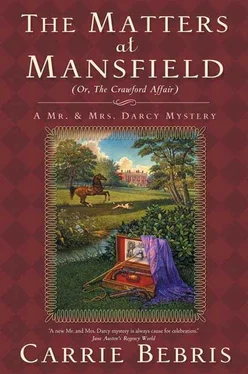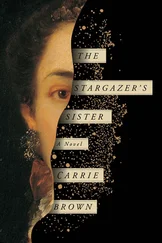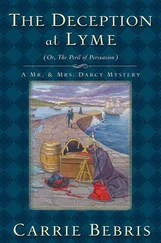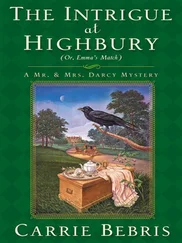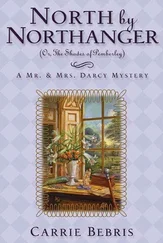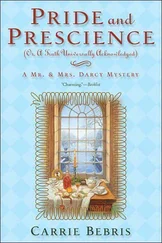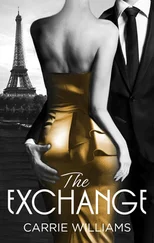“My reading tastes have not strayed to include sensational trial pamphlets, if that is your concern.”
“I should hope not.”
“But I have heard enough of such matters to know that crim con trials and divorce petitions are protracted, humiliating processes with uncertain outcomes. Mr. Rushworth might have decided to seek more immediate satisfaction. Perhaps that was the purpose of his call here — to issue a challenge to Mr. Crawford.”
“With his mother as his second?”
“Though you tease, you might not be far from the mark. She could not serve as his official intermediary, of course, but from what you told me of her, the dowager Mrs. Rushworth may well have pushed him to issue the challenge in the first place.”
“ That is entirely possible. I daresay she was irate enough to challenge him herself, were she able. And Mr. Rushworth struck me as a man in the habit of acceding to her will.”
“The question is, can he shoot?”
“Once a pistol is loaded — which would not be his responsibility, but that of his second — anybody can shoot; one need only fully cock the hammer and pull the trigger. And as challenger, Mr. Rushworth would have chosen the range.” The image of Mr. Crawford’s destroyed countenance once more flashed before Darcy, eliciting an involuntary shudder. “The range, however, would not have been as close as Mr. Crawford’s wound indicates.”
“And when confronting his wife’s lover, a gentleman always adheres to form?”
Darcy did not respond. Instead, he regarded the silk patch in Elizabeth’s hand and imagined it falling to the ground as the ball carried forward to hit its target. How had it come to land so far away, if the range had been so close?
“I think we need to learn more about Mr. Rushworth,” Elizabeth said. “That is, if you want to learn more about Mr. Crawford’s death at all.”
He regarded her quizzically.
“Your inquiry could end right now in this chamber,” she said. “Mr. Crawford injured one of your cousins unpardonably. You owe him nothing, and by investigating the circumstances of his demise you risk exposing another cousin to suspicion, for we are not the only witnesses to Colonel Fitzwilliam’s hostility toward Mr. Crawford. A suicide ruling would scarcely do Anne’s reputation any further damage — it is Meg who stands to lose the most if his estate is forfeited to the Crown. You said earlier that the magistrate seems to consider Mr. Crawford’s death justice served. At this moment, I am the only other person, besides his friend the coroner, who knows of your suspicions. They appear only too willing to consider the issue settled, and one word from you will silence me on this subject forever.”
Had Mr. Crawford indeed lost his life in a duel or some other honorable manner, Darcy might have been able to leave the matter at rest. But if his execution were simple murder, he could not condone that kind of justice. And he would always wonder which had been the case.
“It would be a heavy silence, for it would carry within it my self-respect. And, I warrant, yours. You are correct in that I have no duty to Mr. Crawford to identify his killer and see him punished. But I have a duty to my own conscience and sense of honor. Believing yours to be as stalwart, I am surprised you made the offer.”
“I knew what your reply would be.”
She retrieved her bonnet from the top of the chamber’s tiny chest of drawers and donned it before the even tinier glass. “Now come — we have little time and much to do, starting with acquainting a good number of people with the news of Mr. Crawford’s discovery. I shall be curious as to how each receives it.”
“Do you think the murderer might reveal himself?”
“Not intentionally.” She tied the bonnet under her chin. “But in the unlikely event that he does, perhaps I should bring a muff pistol.”
“Depend upon it I will carry my point.”
—
Lady Catherine, Pride and Prejudice
Anne heard the news in the chamber she had shared with Henry during their brief marriage. She was sitting up in bed, having just finished her breakfast, when Elizabeth and Darcy entered. Colonel Fitzwilliam was seated in a chair at her bedside. The two had been talking, and Anne’s countenance reflected more serenity than it had in days. Elizabeth was reluctant to disturb such hard-won peace with the tidings she bore.
She sat down on the edge of the bed, took one of Anne’s hands, and delivered the censored version of the morning’s events that she and Darcy had agreed upon: Henry’s remains had been found with a head wound; the coroner was examining his body to determine its cause.
Anne released a small gasp and an “Oh, poor Henry!” The colonel, upon receiving the news, blinked in momentary, and to all appearances genuine, surprise, but quickly assumed the detachment of a military commander accustomed to hearing reports of death.
After her initial response, the erstwhile Mrs. Crawford assumed an air of dignified composure. Having started grieving the loss of her husband and marriage when she first learned of Henry’s duplicity, the permanent bereavement was easier to accept. “So I am a bride and a widow in the span of a fortnight,” she said. “Or perhaps neither. It would seem that I am not meant for the marital state.”
“No,” said Colonel Fitzwilliam, “you simply were not meant for Henry Crawford.” He took her other hand. “It may wound you to hear me say this now, but this news frees you. He can no longer wreak havoc with your feelings; his death severs your legal and emotional entanglements with him unquestionably. You need not fear he will come round begging your forgiveness, or torment yourself over whether you should grant it. Mourn him if you must, Anne, but let it not be for long. He does not deserve your tears.”
“I have already shed his share. Any remaining ones are for myself and the wreckage I have made of my life.”
“Then let those be few, as well.”
She nodded and met his eyes. “I am grateful for your friendship through all of this. Were it not for you, I know not how I would bear it.” Her gaze quickly shifted to encompass Elizabeth and Darcy. “Were it not for all of you.” Her gaze strayed back to Colonel Fitzwilliam’s countenance, where it lingered before dropping to their hands, which were yet joined.
Elizabeth studied Anne more closely, a notion forming in her mind. Had Anne developed a tendre for her cousin? The possibility seemed premature, given that she had been widowed — or whatever one called her current state — so little time, but then again, she had not been married long. Or was this not a new attachment? She recalled Anne’s obvious pleasure in dancing with the colonel at the Riveton ball. Had she long harbored feelings for Fitzwilliam, temporarily eclipsed by Henry Crawford’s more passionate flirtation?
Her scrutiny moved to the colonel. His solicitude toward Anne was evidenced by the warmth of his expression as he regarded her. Was he beginning to return her sentiments?
With apparent reluctance, Fitzwilliam released Anne’s hand, rose, and turned to Darcy. “The sooner Mr. Crawford is laid to rest, the better. What arrangements are being made?”
“He will be interred pending the results of the coroner’s examination.”
“I expect his family will want him buried at Everingham. Our aunt has the name of his solicitor, who can notify his sister and uncle. Has Lady Catherine been informed?”
“Not yet.”
“I anticipate her at any moment. She has requested my assistance with—” Footsteps sounded in the hall. “I believe she comes now.”
Читать дальше
